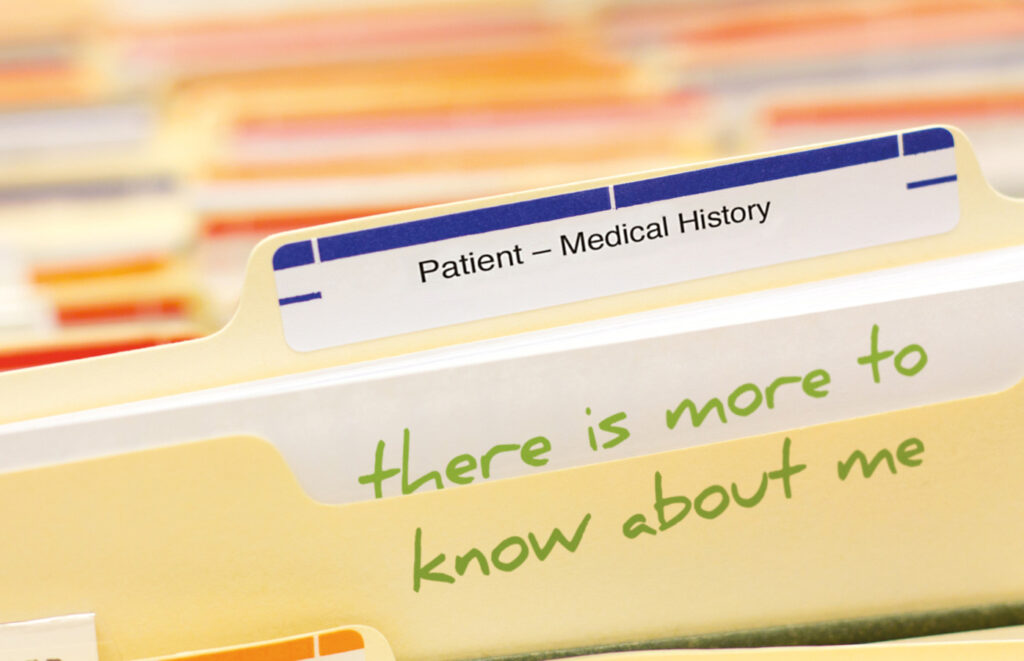Al’s story
“I shouldn’t have to state all the ways I am a functional human being – but I do, because I have a PD diagnosis”
Content warning: sexual violence, bereavement.

I have two diagnoses – EUPD (Emotionally Unstable Personality Disorder) and endometriosis. I am on the waiting list for autism and ADHD assessments, due early next year after years of waiting.
I was told categorically I did not have endometriosis prior to surgery where it was found. In my notes it stated no ADHD symptoms and I was told I do not“”meet the criteria for PTS””, (post-traumatic stress disorder but I do for EUPD.
I have received no beneficial treatment for the low mood I presented to mental health services with. I have a battery of coping strategies I have used throughout my life: healthy diet (rich in nutrients and fresh fruit and veg), activity in nature, mindfulness, supportive relationships.
The psychiatrist who diagnosed me met me for 45 minutes. I have never seen them again.
I have struggled mostly with society, the world not making sense to me. I have experienced trauma in my youth, the death of a parent from terminal illness, various sexual violences and an abusive relationship. I have two university degrees and two children, own my own home and am in a settled long term relationship. I shouldn’t have to state all the ways in which I am a functional human being according to typical standards, but I do, because I have a personality disorder diagnosis.
The psychiatrist who diagnosed me only met me for 45 minutes and I have never seen them again. I have not seen another consultant psychiatrist and despite my complaint to mental health services I have not had a second opinion. I am however, after having had preliminary assessments in university just before the pandemic, and having worked as an occupational therapist through the pandemic with a worsening of endometriosis symptoms over the same period, finally now having an ADHD assessment and an autism assessment in the spring.
There is evidence that people with chronic pain conditions with co-occurring ADHD experience a decrease in pain when taking ADHD medication lessening the need to take sometimes dangerous analgesic medications (painkillers).
The emptiness I was told was a PD symptom has lessened through connection with people I can relate to.
In connecting with the autistic community over the past few years, I feel validated and less alone. The emptiness that the psychiatrist said was a clear trait of EUPD has lessened through connection with people who I can relate to, in the adult autistic community it is understood that professionals are gatekeepers and self-identifying as autistic is often the only option available because of long waiting lists.
I have repeatedly stated to anyone that will listen that neurodivergence (especially autism and/or ADHD) plus trauma results in a type of distress presentation that will be attributed a diagnosis of personality disorder from professionals and the diagnosed individual will be invalidated as a result, with their trauma history often ignored.
What is most shocking of all is that the gold standard treatment dialectic behavioural therapy (a form of talking therapy) is based on applied behavioural analysis – a therapy for autistic people to make them behave like non-autistic people that has been heavily criticised by the autistic community and described as cruel and torturous.
Practitioners of DBT will say that it also uses CBT and mindfulness techniques, but the problem is that because of the EUPD diagnosis, the problem is viewed as being within the person and that needs to be fixed through changing the person’s thoughts and behaviours.
If the person is actually autistic then they need accommodations and adjustments in their environment as their neurology is actually different and cannot be fixed through getting them to attempt to change thoughts and behaviours. This only perpetuates what society has told us our whole lives – that we are too different to be acceptable, that there is something wrong with us.
I no longer work as an occupational therapist as my chronic pain became too debilitating and services were so stretched to breaking point I did not feel we were helping people and could not see stressed colleagues being prepared to learn to give up ableist perspective.
Speak your truth: your own experiences can help create change
If you want to share your experiences around this diagnosis you can take part in Platfform’s Truth Project.
Platfform are campaigning for a review of the use of the diagnosis of PD. Add your voice to our call for change by sharing your story. We will share these with Welsh Government and use them to strengthen our campaign.
For more information, and to access the survey, click here.
If you are in a mental health crisis, please read this paragraph
If you have been affected by anything in this story and would like to talk to someone you can call Samaritans on 116 123. You can also call the national mental health support line for advice on 111 (press 2.)


